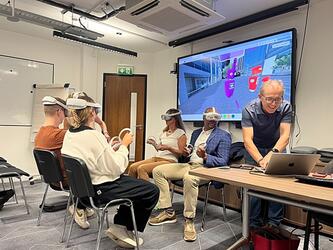Well versed: How could the metaverse impact research?
![]()
The 1992 sci-fi novel Snow Crash is far from a household name, but among the many ideas explored within the novel is a concept of an ‘interactive’ version of the internet. The book named this invention the “metaverse”.
Fast forward a few decades, through world-building games such as Second Life, Fortnite, World of Warcraft and Minecraft to virtual reality (VR) and augmented reality (AR), and we have seemingly stumbled up a far more realistic prospect of a metaverse replacing, or coexisting with, the internet with which we are familiar. The metaverse is the idea of an internet that acts as a universal and immersive virtual world, which users access using VR and AR devices.
Meta, formerly Facebook, has made the most discussed foray into metaverse development, but it remains far from the only major player. Apple, Alphabet (owners of Google) and Microsoft are all pursuing their own metaverse tools, and investment in the technology is into the tens of billions – Meta alone has accounted for $38bn as of October 2022. Then there are existing metaverse platforms that are growing in popularity, such as Roblox, a metaverse gaming platform, which has 58.8 million active users, according to its financial results from November 2022 – a 24% increase on the previous year.
The question for research is whether this represents a ‘flash in the pan’ or something that will require a significant change in work practices. If changes are required, it is important that the industry considers what the future will look like, and how it needs to change to thrive in the metaverse.
“The convergence of virtual and real with the metaverse is completely different to its purely virtual forerunners,” argues Nick Baker, chief research officer at Savanta. “What is clear is that this is a new, emerging communication channel. There are approximately 60bn messages sent daily on Roblox – just one platform.”
Qual implications
Qualitative research is one of the areas that could benefit most from the metaverse. The metaverse could allow people to respond in focus groups, for example, without feeling judged, perhaps allowing them to put more genuine viewpoints across.
“People say they feel more ‘authentic’ in virtual worlds or in the metaverse,” argues Emma Chiu, global director at Wunderman Thompson. “People feel they can express themselves in a way they feel they can’t in the physical world.” Wunderman Thompson has already run a focus group in the metaverse, which involved a diverse group of gamers posing as avatars in the company’s metaverse platform for a moderated conversation on inclusion.
Rupert Sinclair, head of insight, UK at Kadence International, adds: “The immersive nature of the metaverse environment means there is much less split attention. When you have a headset on, you are very present in that moment, and you focus your attention on that in a way I haven’t seen since the last time I did in-person focus groups.”
However, it is true that currently the metaverse is a niche pastime, and that limits its usefulness for research beyond virtual focus groups and interviews. “People are visiting metaverse environments for a particular function or reason, rather than randomly hanging out there, so you need to recruit them and bring them in,” says Karlien Kriegler, co-founder and research director at Hello Ara. “If you have not been in such an environment, it takes a while to orientate and navigate.”
Sinclair adds that this lack of widespread use beyond early adopters also means it may be a while until quantitative research becomes possible in the metaverse. “You would not be able to draw a representative cross-section of the population,” he explains. “It probably skews wealthier and younger in terms of the demographic profile of people who have the headsets. But it seems that is likely to change, and there will be different entry points to the metaverse not just via headsets, but AR through glasses and smartphones.”
Augmented reality
Then there is potential impact of AR, particularly if products such as the ‘Apple Glass’ concept – Apple’s attempt to create digital glasses that connect to the metaverse – come to fruition. For research, this could revolutionise product testing, with users able to explore new products through AR without the need for prototypes, potentially saving thousands of pounds.
Alastair Goode, cognitive scientist at Gorilla in the Room, explains this will require some adaptation in research techniques. “With AR and VR, you have to not think about what you want to say but how you want people to experience it,” he says. “That’s a very different question to ask.”
Goode adds: “The brain is best when it is immersed in a present environment and then responds to that environment. That is what brains are designed to do. When you use AR and VR, rather than taking people into the future or the past, you do research in the ‘now’ – that’s the best place to do research.”
Evolving best practice
Operating in the metaverse could also upturn some accepted theory or practice when it comes to participant responses. There are several implications, such as whether someone taking part in a research project as an avatar – especially one that is an alternative character to the person controlling it – would answer questions as themselves or as the character they have invented.
Training and recruitment of people with the technical skills needed to run research projects in the metaverse in the first place will therefore be vital. Charlotte Smith, global head of qual at Basis, suggests: “There are going to continue to be a lot of questions around best practices and how to conduct research in the ‘right’ way. This will have to be an ongoing and adaptive learning process for all involved.”
Whatever lies ahead, the metaverse will need to evolve to become a mass market feature of all of our lives. For researchers, Baker is of the view that it offers a major opportunity, noting: “Opportunities will inevitably present themselves in terms of what and how we research but that’s the game which is now and truly underway.”

We hope you enjoyed this article.
Research Live is published by MRS.
The Market Research Society (MRS) exists to promote and protect the research sector, showcasing how research delivers impact for businesses and government.
Members of MRS enjoy many benefits including tailoured policy guidance, discounts on training and conferences, and access to member-only content.
For example, there's an archive of winning case studies from over a decade of MRS Awards.
Find out more about the benefits of joining MRS here.














0 Comments